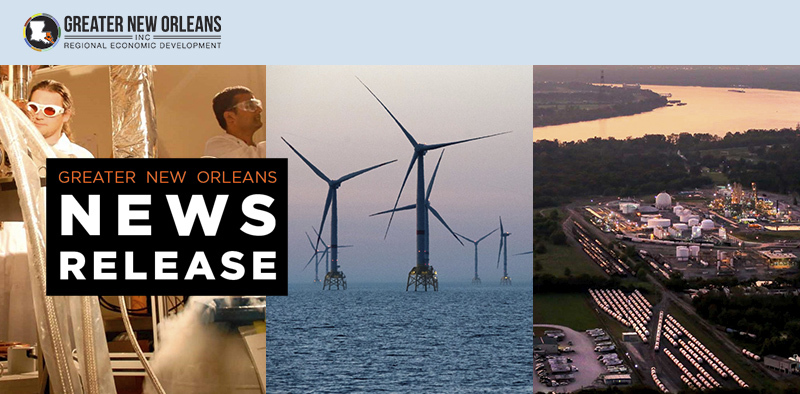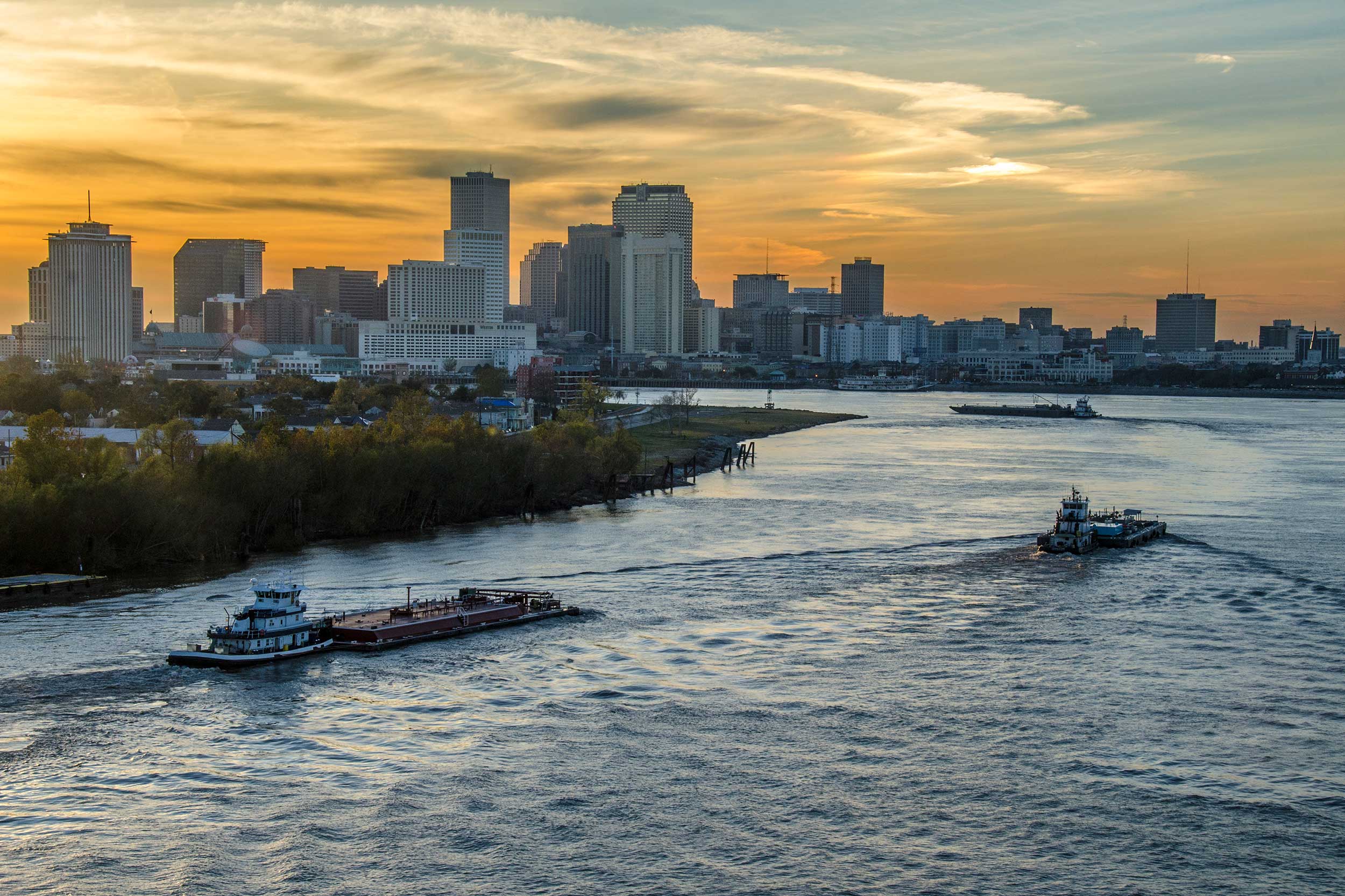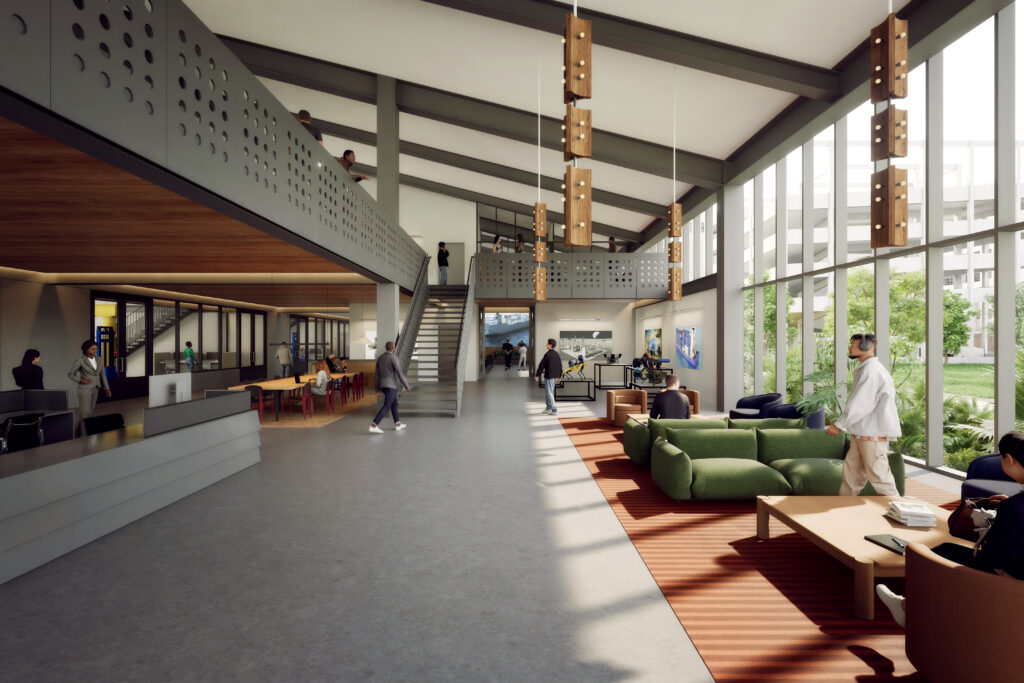
Next-Generation Energy Proposal for South Louisiana Chosen as Finalist in EDA’s Build Back Better Regional Challenge
The Greater New Orleans Development Foundation, the 501(c)(3) arm of Greater New Orleans, Inc., has been named by the Economic Development Administration (EDA) as a finalist in the $1 billion Build Back Better Regional Challenge. The coalition will advance to Phase 2 and compete for up to $100 million in American Rescue Plan funding to develop and scale H2theFuture, a transformative energy cluster strategy, based on clean hydrogen, to decarbonize the South Louisiana industrial corridor.
The strategic advisory firm, McKinsey & Co. estimates that, at scale, the U.S. hydrogen economy will support over 3.4 million jobs by 2050. The H2theFuture strategy ensures that the South Louisiana energy corridor will attract a disproportionate share of jobs and economic benefits for communities involved in the global energy transition.
“GNO, Inc. is thrilled that a coalition from across South Louisiana – including Economic Development Organizations, Economic Development Districts, Government Partners, Universities, Businesses, and Nonprofits – has been selected to advance in the BBB Challenge,” said Michael Hecht, GNO, Inc. President & CEO. “Louisiana has been a leader in energy and industry for generations, and the H2theFuture plan is the strategy for Louisiana to continue to lead, into a lower-carbon future. The beneficiaries will include energy workers, rural communities, and historically marginalized populations. Moreover, the winners will be the Louisiana economy and environment.”
The challenge is assisting communities nationwide in their efforts to build back better by accelerating the economic recovery from the coronavirus pandemic and building local economies that will be resilient to future economic shocks. The Build Back Better Regional Challenge is the largest economic development initiative from the U.S. Department of Commerce in decades.
“By awarding our state two of the 60 Build Back Better Challenge grants announced today, President Biden and Secretary of Commerce Raimondo are casting a significant vote of confidence in Louisiana’s ongoing clean energy and bioscience innovation efforts,” Gov. John Bel Edwards said. “The Greater New Orleans Development Foundation’s proposed green hydrogen energy cluster in south Louisiana would move us closer to our goal of net zero emissions by 2050. The Gulf Coast Health Sciences Corridor, led by the New Orleans BioInnovation Center, would accelerate the growth of Louisiana’s robust life sciences sector. Both projects would create new jobs, stimulate the regional economy, improve the wellbeing of our communities, and increase opportunities in underserved communities. We look forward to working with our regional and local partners to move these projects forward and make these economic visions a reality.”
Greater New Orleans Development Foundation is part of a regional coalition of stakeholders from government, business, nonprofits, and academia. As a finalist, the coalition was awarded $500,000 to develop a plan to implement five projects focused on developing a next-generation energy cluster in South Louisiana. If provided an implementation grant, the coalition proposes to coordinate and execute five interrelated projects to support the H2theFuture strategy to catalyze the production and use of green hydrogen.
“Louisiana’s outstanding showing in the Build Back Better Challenge is a testament to the strength of our economic development partnerships across the state,” LED Secretary Don Pierson said. “A broad coalition of stakeholders came together to create visionary plans for enhancing our state’s energy and life sciences sectors through innovative programming with an equity focus. I believe the outcomes resulting from this award would generate transformative economic development for the region, the state, and the greater Gulf South.”
Hydrogen is a key feedstock in most industrial processes, including refining, steel, and petrochemicals. For example, hydrogen is a key ingredient in ammonia, which is used to make the fertilizer that feeds the world. “Green” hydrogen is produced by using renewable energy (e.g. produced by offshore wind) to power electrolyzers that make hydrogen (H2) from water (H2O). Green hydrogen has zero carbon footprint, compared to traditional, “gray” hydrogen, which is made from natural gas or coal, and emits CO2. As an emerging clean hydrogen hub, South Louisiana is well positioned to attract new investments from these sectors to further diversify the region’s energy cluster.
The H2theFuture projects include: the Preparing Our Workforce for Energy Renewal (POWER) training program; Green Hydrogen End-to-End Pilot Program; Net-Zero Business Development; Innovation by Air, Land & Sea, three R&D infrastructure projects in green hydrogen, carbon utilization and sequestration, and naval engineering; and the New Energy Institute of America, which will be a physical hub of the green hydrogen cluster to coordinate stakeholders and incubate clean energy startups.
Partner organizations that will implement the projects outlined in H2theFuture are: Acadiana Planning Commission, Baton Rouge Area Chamber, Capital Area Regional Planning Commission, City of New Orleans, Dillard University, Greater New Orleans Development Foundation/Greater New Orleans, Inc., Green Light New Orleans, Louisiana Black Chamber Foundation, Louisiana Community & Technical Colleges, Louisiana Economic Development, Louisiana Governor’s Coastal Activities Office, Louisiana Parole Project, Louisiana State University, National Center for Advanced Manufacturing, National Renewable Energy Laboratory, New Orleans Regional Planning Commission, One Acadiana, Opportunity Hub, South Louisiana Economic Council, Southern University and A&M College, Southern University at New Orleans, Southwest Louisiana Economic Development Alliance, Tulane University Energy Institute, University of Louisiana at Lafayette, University of New Orleans, Urban League of Louisiana, and Xavier University of Louisiana.
In addition to these partners, over 30 private companies from across South Louisiana and several national research labs submitted letters of support for the proposal.
“The Build Back Better Regional Challenge aims to supercharge local economies and increase American competitiveness around the globe,” said Secretary of Commerce Gina M. Raimondo. “The outpouring of interest in this program shows the demand for the Build Back Better agenda and the desire to not only create good-paying jobs, but also strengthen our country’s economic resiliency for years down the road.”
Phase 1 of the Build Back Better Regional Challenge invited coalitions to apply for funding to implement a collection of three to eight distinct but related projects in their region. Projects need to be in coordination with industry and community partners, and aligned around a holistic vision to build and scale a strategic industry sector.
“As we recover and rebuild from COVID-19 and Hurricane Ida, southeast Louisiana needs innovative new projects to help re-energize our local economy,” said Troy Carter, U.S. Representative, Louisiana’s 2nd Congressional District. “I am thrilled to hear that Greater New Orleans Development Foundation’s ‘Hydrogen to the Future’ project is a finalist for funding from the Economic Development Administration’s Build Back Better challenge. This proposal would seize the moonshot opportunity to catalyze a renewable hydrogen industry in South Louisiana, protecting the environment and jobs. I was proud to write a letter of support for their application.”
EDA received 529 applications from regions in all 50 states and five territories, and the 60 finalists represent regions that formed extraordinary coalitions, demonstrated regional needs, and presented bold proposals to grow their target industry clusters. Ranging from rural communities and coastal towns to major metros, the finalists make up a diverse cross-section of the United States.
In Phase 2, finalists will compete for significant implementation assistance. EDA will award 20- 30 coalitions each up to $100 million. These awards will assist communities in executing ambitious plans to supercharge their regional economies across a variety of strategic growth sectors. The deadline for Phase 2 applications is March 15, 2022.
Learn more at eda.gov/arpa/build-back-better.


